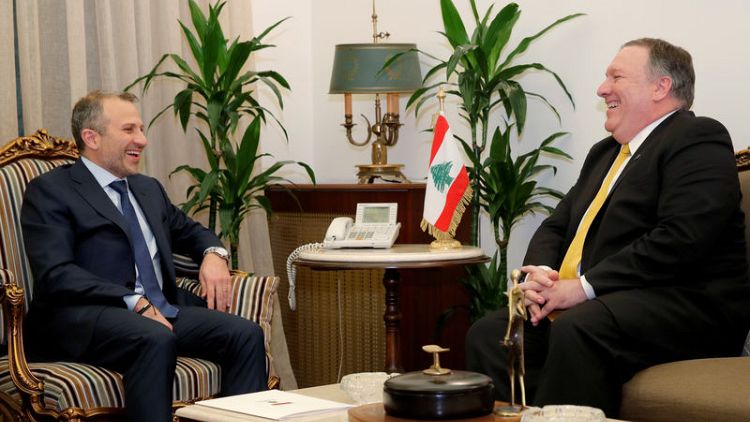By Lisa Barrington
BEIRUT (Reuters) - U.S. sanctions on Iran and its Lebanese ally Hezbollah are working, Secretary of State Mike Pompeo said on Friday on a visit to Beirut, calling on Lebanon to stand up to the Shi'ite group which he accused of "criminality, terror and threats".
Lebanese politicians who met Pompeo, including President Michel Aoun, Parliament Speaker Nabih Berri and Foreign Minister Gebran Bassil -- all political allies of Hezbollah -- said they had told him the group was part and parcel of Lebanese politics.
"From our side, we confirmed as far as we are concerned Hezbollah is a Lebanese party -- not terrorist -- with MPs elected by the Lebanese people and with a lot of popular support," Bassil said as he stood alongside Pompeo after their meeting.
Pompeo, who is touring the Middle East to drum up support for Washington's harder line against Iran, cited a speech by Hezbollah leader Hassan Nasrallah this month asking the group's supporters for funds as evidence U.S. pressure was working.
"Our pressure on Iran is simple. It's aimed at cutting off the funding for terrorists and it's working," Pompeo said. "We believe that our work is already constraining Hezbollah's activities."
Pompeo said Iran gave Hezbollah as much as $700 million a year.
The heavily armed Hezbollah has a large militia that has participated in Syria's civil war alongside President Bashar al-Assad's government, but it also has elected members of parliament and positions in Lebanon's national unity government.
The group's influence over Lebanese state institutions has expanded in the last year. Together with allies that view its arsenal as an asset to Lebanon, it won more than 70 of parliament's 128 seats in an election last year.
The group has taken three of the 30 portfolios in the government formed in January by Western-backed Prime Minister Saad al-Hariri, including the health ministry -- the first time it has held a ministry with a significant budget.
LEBANON FACES A CHOICE
Pompeo said he shared concerns about "external and internal pressures on the government, including coming from some of its own members, which do not serve an independent thriving Lebanon".
The United States would continue to use "all peaceful means" to choke off financing that "feeds Iran and Hezbollah terror operations", he said, pointing to "smuggling, criminal networks and the misuse of government positions".
"Lebanon faces a choice: bravely move forward as an independent and proud nation, or allow the dark ambitions of Iran and Hezbollah to dictate your future," he said.
Lebanese President Michel Aoun earlier told Pompeo that Hezbollah was a Lebanese party with popular support, the Lebanese presidency said.
"Preserving national unity and civil peace is a priority for us," Aoun told Pompeo, the presidency said on its Twitter feed.
Speaker Berri said earlier in a statement that he had told Pompeo that Hezbollah's "resistance" against Israel was a result of continuing Israeli occupation of Lebanese territory.
Israel, the closest U.S. ally in the Middle East, regards Iran as its biggest threat and Hezbollah as the main danger on its borders.
Bassil said Lebanon was committed to calm in the south, which borders Israel, adding that the country had the natural right to defend itself and "to resist any occupation of its land ... this is a holy right".
Hezbollah's al-Manar television reported in its afternoon news broadcast that Pompeo was in Beirut "to incite Lebanese against each other".
ENERGY DISPUTE
Appearing to give an upbeat assessment of U.S. mediation efforts to resolve a maritime border dispute between Lebanon and Israel, Bassil said Beirut had an opportunity to recover its rights with a "political and diplomatic victory".
"We will make the necessary efforts with all parties internally to reach an honourable agreement for Lebanon that preserves its rights," he said.
Beirut has an unresolved maritime border dispute with Israel over a sea area extending along the edge of three of Lebanon's southern energy blocks.
Lebanon has also previously warned its Mediterranean neighbours that a planned EastMed gas pipeline from Israel to the European Union must not be allowed to violate its maritime borders.
During his meeting with Berri, Pompeo "expressed hope that Lebanon would be able to join the other states of the Eastern Mediterranean in developing offshore resources in a manner of benefit to all the people of Lebanon", a state department spokesman said.
Bassil called on American companies to take part in forthcoming energy tenders in Lebanon.
(Reporting by Lisa Barrington, Tom Perry, Angus McDowall; Writing by Angus McDowall, Editing by William Maclean and Catherine Evans)
